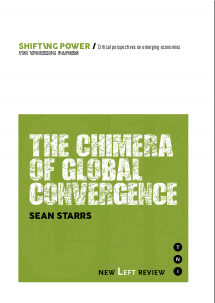Ideas into movement
Boost TNI's work
50 years. Hundreds of social struggles. Countless ideas turned into movement.
Support us as we celebrate our 50th anniversary in 2024.

The narrative of Western decline in the face of the rise of the BRICS is overstated and misleading. Only China seems to pose any challenge to continued US political and economic dominance

It has become a staple of conventional wisdom that global economic power is shifting inexorably towards the East and the South. Many insist that we are on the brink of a world-historic rebalancing that will result in the end of Western domination and the rise of a new hegemony. In particular, the emergence of China on the world stage—or re-emergence, if one has a longer timescale in mind— is seen as heralding the dawn of an ‘Asian Century’.
Yet this narrative of Western decline is misleading, above all because it greatly exaggerates the fading of the US as the world’s leading capitalist power. In fact, the contemporary rise of socalled ‘emerging markets’ poses even less of a challenge to US leadership than the revival of Western Europe and Japan in the postwar decades. There is already evidence to suggest that the growth rates of these markets may have peaked around 2011, without altering their basic dependence on commodity exports to Western economies (with the partial exception of China). The road towards convergence between the West and the Rest is a great deal rockier than most commentators believe, and there is no certainty about the outcome.
For the most part, debates on these questions lack a solid empirical foundation. Many of the scholars who conduct serious research in this area are hampered by a methodology that has become anachronistic in the age of global capitalism, one that equates national power with national accounts—GDP above all, but also balances of trade and payments, shares of world manufacturing and so on—as if we still lived in a world of nationally discrete political economies.
Whether or not the equation ‘GDP = power’ was meaningful in the 1950s, the globalization of capital in recent decades has clearly rendered it problematic. When a substantial, often growing proportion of economic activity within a country’s borders is directed by foreign capitalists, we need to rethink the way that we measure national power—which does not mean that the concept itself is now irrelevant, as some have argued, since power is still nationally organized and concentrated.
It is useful in this respect to compare the past rise of Japan with the present rise of China. When Japanese electronics and automobiles began flooding Western markets in the 1960s and 70s, this was reflected both in a rising Japanese trade surplus and GDP and in the strengthening of Japan’s major corporations, many of which became household names.
China, meanwhile, has seen its trade accounts and GDP soar in the age of globalization, and has become the world’s biggest exporter of electronics since 2004. Yet this growth has not been matched by the emergence of Chinese firms as world leaders in the field. Ninety per cent of what China Customs classifies as hightechnology exports is actually produced by foreignowned companies.1 Thus, while an increasing share of global manufacturing takes place in the PRC, much of this production is controlled, directly or indirectly, by outside interests. The contrast with Japan’s earlier ascent is stark. Any survey of global economic power must therefore take account of this shift, which means focusing our attention on the world’s leading transnational corporations.
This essay was first published in New Left Review (May-June 2014) and is republished here as part of TNI’s Shifting Power working paper series with NLR’s kind permission.